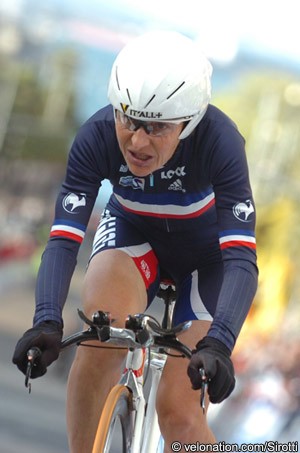French laws were not properly followed, rider cleared
 The French anti-doping agency AFLD today backed down on the case involving Jeannie Longo, deciding not to appeal a decision taken by the French cycling federation FFC earlier this month.
The French anti-doping agency AFLD today backed down on the case involving Jeannie Longo, deciding not to appeal a decision taken by the French cycling federation FFC earlier this month.
On December 1st FFC president David Lappartient indicated that the federation would drop Longo’s anti-doping case, started when she committed three whereabouts violations. He agreed with her lawyers’ arguments that the AFLD hadn’t complied with a French law stating that athletes must be officially informed each year that they are part of the testing pool.
The AFLD today acknowledged that in a statement. “At the time of the third infringement which was found against the defendant, she had ceased to belong to the target group due to the effect of a limitation to one year of such membership,” it said.
“Before the expiration of one year, the membership of the person concerned can be repeated for a further period of one year. However, it became apparent to the College that in this case, the decisions to proceed with the renewal of registration in the target group left room for uncertainty as to the scope of the existence of a third violation..the whereabouts obligations of the athlete in question could not be regarded as established.” Longo has therefore been cleared as a direct result of the AFLD’s oversight.
Today’s statement made no mention of claims made against Longo’s husband and coach Patrice Ciprelli by Joe Papp. The former pro’s testimony against other athletes has helped secure suspensions against them in the US, but the AFLD and the FFC have given no indication that they will proceed with a French investigation.
Papp’s claim led to Ciprelli’s temporary suspension and Longo’s decision to withdraw from the French team for the world championships. A month and a half ago, Ciprelli won a ruling from the Adminstrative Tribunal in Grenbole, which expressed “serious doubts” about the legality of the FFC decision to sideline him.
The suspension was dismissed and the federation was also ordered to pay 500 euros to him to help cover the court costs.
A case made complicated by technical errors:
In early September L’Equipe revealed that multiple world champion and past Olympic gold medallist Longo was in danger of missing the world road race championships after a disciplinary action was opened up against her. The French newspaper said then that Longo twice failed to provide her whereabouts, receiving warnings by registered mail from the French anti doping agency AFLD in relation to that.
It said that a third incident occurred in the US, where she was preparing for what would become her eleventh French national time trial title. Doping control officers from USADA arrived at the hotel where she was staying and where she noted she would be available, only to find her absent.
She was given a third warning as a result and a dossier was passed to the AFLD so that a disciplinary action could be started.
Ciprelli was subsequently suspended and Longo indicated that because of the stress she was under, that she would withdraw from the French world championship squad.
The FFC held a disciplinary hearing on November 8th, where her lawyers Pierre Albert and Burno Ravaz acknowledged three incidents had occurred between June 11th 2009 and June 30th 2011. However they claimed that she should not have been in the testing pool for that length of time.
According to L’Equipe, they cited a French law passed on 14 April 2010, which changed the procedure pertaining to out of competition testing. Under the new rules, athletes had to be officially informed they were part of the testing pool by the AFLD, and that this needed to be renewed annually; Longo’s lawyers argued that while she was included in the target group two years earlier, she was never officially informed she was part of it after the law was introduced.
At the time of the hearing, VeloNation contacted WADA for clarification of its rules on out of competition testing. While section 11 of the International Standard for Testing states that the international registered testing pool should generally include those athletes who ‘compete regularly at the highest level of international competition,’ which Longo does, its spokesman Terence O’Rorke indicated that the Anti-Doping organizations (ADOs) and International federations were ultimately responsible for determining which athletes should be included in the testing pools.
Lappartient said on December 1st that she had French law on her side. “There are real legal arguments today in favour of Jeannie Longo, particularly of administrative problems,” he told RMC Sport. “We are a country of law. Today it seems that the athlete has not been put in the target group in the usual way. We must take all the consequences of that.”
His comments clearly referred to the AFLD and, today, that body acknowledged that the case could go no further.
Longo now appears to be clear to continue pushing towards the next Olympics. She has won the French championship title for the past four years, and taken eleven TT championships in all. Providing she can maintain her focus, she would appear to have a strong chance of qualifying for London 2012.
The AFLD will presumably now put her in the testing pool and ensure that it follows the regulations closely from this point on.